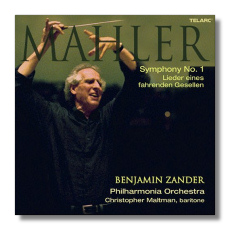
The Internet's Premier Classical Music Source
Related Links
- Mahler Reviews
- Latest Reviews
- More Reviews
-
By Composer
-
Collections
DVD & Blu-ray
Books
Concert Reviews
Articles/Interviews
Software
Audio
Search Amazon
Recommended Links
Site News
 CD Review
CD Review
Gustav Mahler

- Symphony #1 in D "Titan"
- Lieder eines fahrenden Gesellen
Christopher Maltman, baritone
Philharmonia Orchestra/Benjamin Zander
Telarc 2CD-80628 DDD 2CDs: 68:33, 79:06
Also released on Hybrid SACD 2SACD-60628
Amazon
- UK
- Germany
- Canada
- France
- Japan
- ArkivMusic
- CD Universe
Benjamin Zander continues his essential Mahler series for Telarc with this outstanding release. Again, the conductor has put head and heart together to create a recording which practically makes the composer appear before our very eyes, raising him from the dead, as it were. Nothing is left to chance, and yet the illusion of musical spontaneity has been retained. Of Zander's scholarship there is little doubt, and his ability to translate scholarship into a living performance is clearly displayed here. The symphony's first movement, after an opening of powerful mystery, unfolds with inevitability. Mahler's (and Zander's) love of life and nature are easily felt. The second movement feels rustic and rough, full of hay, good wine, and Gemütlichkeit. Zander does not smooth over the weirdness of the third movement, starting with the double bass and its lugubrious take on "Brüder Martin." The parodistic elements in this movement are brought out but not exaggerated. Zander plays the Finale as if it were a life-and-death struggle (which it is, of course), and snatches victory - a hard won victory, at that - from the jaws of defeat. The final triumph is the more impressive for not having been easily achieved. Zander's understanding of this movement;s architecture is very evident.
Like Bruno Walter, Zander omits the repeat in the first movement, believing that Mahler's second-thought addition of a repeat sign in this movement was a mistake born of inexperience and momentary insecurity. The omission didn't bother me, but some might feel differently.
The performance of the Wayfarer Songs, so closely tied to the First Symphony, is similarly excellent, with many finely-judged details creating a compelling whole. Baritone Maltman sounds remarkably like Dietrich Fischer-Dieskau, but not even Uncle Dietrich got so much mileage out of the exclamation of "Heia!" in "Ging heut' Morgen über's Feld."
Telarc's recording gives Mahler's climaxes a real wallop. I did feel, however, that the symphony's quiet passages sometimes sounded too loud.
As usual, there is a bonus disc in which Zander discusses the repertoire. Whether you're new to Mahler or a longtime admirer of his music, there's something you can learn from Zander's recorded lecture. Like Leonard Bernstein, his enthusiasm and knowledge are infectious.
There are many fine Mahler Firsts out there. (Kubelík's on Deutsche Grammophon is the first to come to mind.) Zander doesn't erase them from memory, but he definitely belongs in their company.
Copyright © 2005, Raymond Tuttle




















